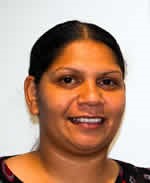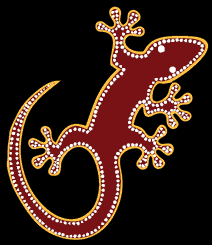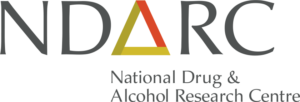According to national surveys the proportion of Aboriginal and Torres Strait Islander people reporting risky drinking has declined overall since 2010 (from 48% in 2010 to 33% in 2022-23) [48574][40728]. However, alcohol use continues to cause a heavy burden of harm to individuals and community health and wellbeing [46914].
While drinking patterns can vary greatly [39570], information from large national surveys [48752][40728][39231] indicate that:
Key surveys containing information on prevalence of alcohol use are: the National Aboriginal and Torres Strait Islander Health Survey (NATSIHS) and the National Drug Strategy Household Survey (NDSHS) which can be found under publications in this section. For a summary of statistical information updated yearly on alcohol use among Aboriginal and Torres Strait Islander people, see also our latest Overview of Aboriginal and Torres Strait Islander health status.

 The logo was created by Donna Rioli, a descendant of the Tiwi people (islands 80 km north of Darwin, Northern Territory) on her father’s side and the Nyoongar people of Western Australia on her mother’s side. The gecko was chosen because it is one of a few animals that are found across the great diversity of Australia. The image focuses symbolically on the pathway through life.
The logo was created by Donna Rioli, a descendant of the Tiwi people (islands 80 km north of Darwin, Northern Territory) on her father’s side and the Nyoongar people of Western Australia on her mother’s side. The gecko was chosen because it is one of a few animals that are found across the great diversity of Australia. The image focuses symbolically on the pathway through life.
The Alcohol and Other Drugs Knowledge Centre is fully funded through the Australian Government Department of Health and Aged Care through the Indigenous Australians’ Health Programme. The Indigenous Australians’ Health Programme aims to improve the health of all Aboriginal and Torres Strait Islander people through a variety of comprehensive activities focused on local health needs as well as targeted activities addressing geographic and specific disease processes, including alcohol and other drug use. The Knowledge Centre is funded under the Alcohol and Other Drugs Programme within the Indigenous Australians’ Health Programme.

The following national alcohol and other drugs research centres are partners in the Alcohol and Other Drugs Knowledge Centre:
Together these Collaborating Centres greatly enhance the capacity of the Knowledge Centre to provide the evidence base to support effective harm minimisation through both workforce support and policy support.



The Alcohol and Other Drugs Knowledge Centre is guided, in its work, by a Reference Group which provides expertise and advice on providing the evidence base to support the workforce and community members in addressing harms from alcohol and other drug (AOD) use among Aboriginal and Torres Strait Islander people.
The Reference Group is made up of representatives from the national AOD research centres (NCETA, NDRI, NDARC) [i] , peak alcohol and other drug bodies, and senior managers of Aboriginal and Torres Strait Islander community services. Representatives on the Reference Group are from states and territories across Australia and reflect the variety of input needed to ensure a robust national coverage of the field.
The Reference Group provides invaluable guidance to the Knowledge Centre on the evolving requirements of the workforce. The benefits of this engagement provide a pathway for effective knowledge exchange in supporting translation of research into policy and practice and ensuring that resources and information are timely, relevant and accessible to a broad audience.
[i] the National Centre for Education and Training on Addiction (NCETA), the National Drug and Alcohol Research Centre (NDARC) and the National Drug Research Institute (NDRI)
Dr Annalee Stearne
Operations Manager, Australian Alliance for Indigenous Genomics
Telethon Kids Institute
Perth, Western Australia
Daniel Morrison
Chief Executive Officer
Wungening Aboriginal Corporation
Perth, Western Australia
Eddie Fewings
Engagement and Sector Development Lead
Queensland Network of Alcohol and Other Drug Agencies (QNADA)
Brisbane, Queensland
Associate Professor Noel Hayman
Clinical Director and Medical Practitioner
Inala Indigenous Health Service
Brisbane, Queensland
Scott Wilson
Chief Executive Officer
Aboriginal Drug and Alcohol Council of South Australia
Adelaide, South Australia
Co-Deputy Director
Centre for Research Excellence Indigenous Health and Alcohol
Professor Simon Lenton
Director
National Drug Research Institute
Perth, Western Australia
Professor Anthony Shakeshaft
UQ Poche Centre for Indigenous Health
Toowong, Queensland
Professor Jacqueline Bowden
Director
National Centre for Education and Training on Addiction, Flinders University
Adelaide, South Australia
Dr Jocelyn Jones
Senior Research Fellow and Program Leader
National Drug Research Institute
Perth, Western Australia
Dr Sara Farnbach
Post-Doc Research Fellow
National Drug and Alcohol Research Centre, University of New South Wales
Sydney, New South Wales
Two concepts underpin the work of the Australian Indigenous HealthInfoNet and the Alcohol and Other Drugs Knowledge Centre. The first is to support the workforce and assist in knowledge-informed decision-making, whereby practitioners and policy-makers have access to the best available research and other information. The second is that of knowledge exchange (KE), which involves making research and other information available in a form that has immediate, practical utility. Knowledge exchange can help to enhance the critical health literacy of all those working in the Aboriginal and Torres Strait Islander health sector. The cornerstones of effective KE are that the information should be timely, accessible and relevant.
Knowledge synthesis, a central aspect of KE, converts a wide range of health research and other relevant information into forms that are meaningful to people working at improving the health of Indigenous people. The Knowledge Centre’s narrative reviews provide a synthesis of information on specific topics, bringing together the relevant evidence, essential contextual information, pertinent policies and a discussion of best-practice in prevention and management of harms from alcohol and other drug use for Aboriginal and Torres Islander people. A summary of these reviews is provided, along with a factsheet and video with the aim of making the information accessible to a broad audience.
Information technologies (IT) are vital to successful knowledge exchange activities; IT enhances information sharing. Visual approaches to knowledge exchange can be particularly effective. For example infographics are a popular medium for knowledge exchange for a number of important reasons: they capture attention, retain attention, enhance the capacity to memorise information, enhance critical thinking and actually stimulate cognitive activity. Our emerging suite of visual knowledge exchange tools developed as part of the Digital Evolution Strategy include eBooks, animated infographics, short films, and podcasts.
The Knowledge Centre’s KE draws heavily on the staff’s understanding of the various sources of information about Aboriginal and Torres Strait Islander health and wellbeing, and their skills and experience in identifying and collecting these materials.
The Australian Indigenous HealthInfoNet Alcohol and other Drugs Knowledge Centre (the Knowledge Centre) is a national website that provides relevant and culturally appropriate resources and information for health practitioners and community members working to reduce harms from alcohol and other drug (AOD) use among Aboriginal and Torres Strait Islander people.
The Knowledge Centre collates a comprehensive range of quality materials such as patient education resources, clinical guidelines, culturally safe programs, peer reviewed publications and professional development information. The aim of the Knowledge Centre is to support the practice of AOD workers, community members, health practitioners, researchers, policy makers, and service managers to address problem alcohol and other drug use and the impact on the health of Aboriginal and Torres Strait Islander people.
Harmful AOD use cannot be separated from the ongoing effects of colonisation and the social determinants of health. The Knowledge Centre takes a broad view of Aboriginal and Torres Strait Islander health, along the lines used by the National Aboriginal Health Strategy Working Party [10967], and expanded by the National Aboriginal Community Controlled Health Organisation (NACCHO):
Health is not just the physical wellbeing of an individual, but the social, emotional, and cultural wellbeing of the whole community in which each individual is able to achieve their full potential as a human being thereby bringing about the total wellbeing of their community.
The Knowledge Centre contains timely and relevant information on a wide range of topics from specific drug types to harm reduction and social and emotional wellbeing.
Each topic (portal) provides a comprehensive collection of alcohol and other drug information including:
Other features of the Knowledge Centre include:
The Alcohol and Other Drugs Knowledge Centre was established by the Australian Indigenous HealthInfoNet (HealthInfoNet).
The high quality, relevant and up to date content of the Knowledge Centre is consistent with the National Drug Strategy 2017-2026 and the three pillars of; demand reduction, supply reduction, and harm reduction. The three pillars are supported by the Knowledge Centre’s commitment to build the capacity of the AOD workforce, promote evidence-informed practice across sectors, and encourage greater integration between policy, practice and research.
The Knowledge Centre is managed by the Australian Indigenous HealthInfoNet and is guided by a Reference Group made up of:
These stakeholders come from various states and territories of Australia and include Aboriginal and Torres Strait Islander representation. The composition of the Reference Group reflects the variety of input required to ensure coverage of the field to best support: the workforce at the community level; and people working in programs and policy.
The Reference Group and the national alcohol and other drug research centres (NDRI, NDARC and NCETA) provide valuable guidance through Reference Group meetings and on specific topics in their areas of expertise.
Fetal alcohol spectrum disorder (FASD) is a diagnostic term used to describe a range of neurodevelopmental impairments and other health effects on an individual caused by prenatal alcohol exposure (PAE)[51039]. Neurodevelopmental impairments can include; difficulties with learning, language, memory, planning, emotional regulation and motor skills [42715]. FASD is also associated with an increased risk of health issues with hearing, vision, the heart and musculoskeletal problems [49051]. Diagnosing FASD is complex. It is recognised that some features common to FASD can also be a result of genetic and environmental factors and that the effects of PAE interact with protective and risk factors [51039].
The Australian guidelines for assessment and diagnosis of Fetal Alcohol Spectrum Disorder [51039] and the accompanying Australian guidelines for assessment and diagnosis of Fetal Alcohol Spectrum Disorder: FASD Indigenous framework [51275] are resources aimed at supporting culturally responsive, strength-based and healing informed assessment and diagnostic services for FASD in an Australian context.
FASD may be diagnosed at birth, but in many cases, the diagnosis occurs later, when an individual is having significant problems with learning or behaviour that impacts on their daily functioning [51039]. Early diagnosis can help parents and carers to understand the needs and behaviours of a family member affected by FASD [42527][26090][35916].
Strategies which help to improve the long term outcomes for individuals and families affected by FASD include [51039][51275]:
At a population level, FASD can be prevented by promoting awareness of the harmful effects of exposure to alcohol while pregnant, and reducing the ready availability of alcohol [35916].
While not every alcohol exposure during pregnancy results in FASD, there is no safe time to have alcohol during pregnancy [42089]. The Australian guidelines to reduce health risks from alcohol recommends that individuals who are planning to have a baby, or are pregnant should not drink alcohol, and for individuals who are breast feeding, the safest choice is not to drink alcohol.
Health workers, GPs, and maternity services have an important role in reducing the risks of FASD through routine screening of all pregnant individuals [35916]. Routine screening creates opportunities to provide information, brief intervention or referral to support services. The role of partners in supporting individuals who are pregnant or breastfeeding to not drink alcohol during pregnancy and breastfeeding is also important [23933].
The most recent policy in response to FASD, the National Fetal Alcohol Spectrum Disorder (FASD) Strategic Action Plan 2018-2028 outlines four national priorities [35916].
These are:
A range of health promotion and practice resources have been developed to support health practitioners and raise awareness of FASD. Please see the Knowledge Centre’s listing of resources, programs, organisations.
For more information about FASD for carers and health professionals please also visit FASD Hub Australia.